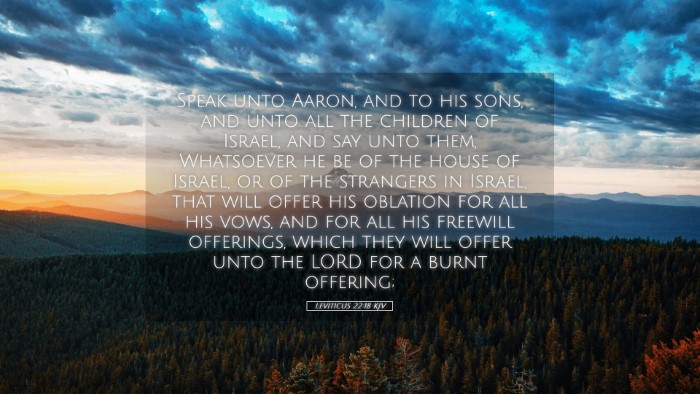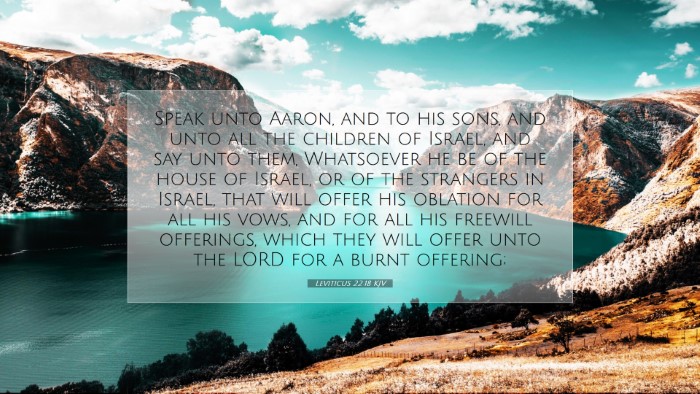Commentary on Leviticus 22:18
Text of the Verse: "Speak unto Aaron, and to his sons, and to all the children of Israel, and say unto them, Whosoever he be of the house of Israel, or of the strangers in Israel, that will offer his oblation for all his vows, and for all his freewill offerings, which they will offer unto the LORD for a burnt offering."
Introduction
The Book of Leviticus serves as an essential manual for the priests of Israel, outlining the laws concerning worship, sacrifices, and the holiness expected from the people of God. This particular verse, Leviticus 22:18, encapsulates significant themes regarding offerings, the people eligible to present them, and the nature of religious devotion. Insights from public domain commentaries provide in-depth interpretations valuable for pastors, theologians, and biblical scholars.
Contextual Background
Matthew Henry's Commentary: Matthew Henry highlights that this section of Leviticus continues to stress the importance of purity in offerings. The regulations set forth are not merely ritualistic; they hold deep spiritual significance. Henry explains that God expects His people to present their offerings from a place of holiness, reflecting their recognition of God's sovereignty and grace.
Albert Barnes's Notes: Barnes notes that this directive was addressed not only to Aaron and the priests but also to the entire congregation of Israel. This inclusion emphasizes the communal aspect of worship within the Israelite community. He elaborates on the phrase "strangers in Israel," indicating that non-Israelites who joined themselves to Israel also had the opportunity to partake in the worship and the offerings prescribed by God.
The Nature of Offerings
- Oblations for Vows: The offerings made in response to vows signify a commitment made before God. This act highlights the gravity of promises in the spiritual life of the believer. Adam Clarke stresses that it is crucial for one to fulfill their vows as an expression of faith and accountability.
- Freewill Offerings: The notion of freewill offerings signifies a voluntary act of devotion to God. Henry emphasizes that this reflects the inner disposition of the heart toward God, showcasing a joyful willingness to give.
Theological Insights
Spiritual Significance: The call to offer sacrifices showcases not only obligation but also heartfelt devotion. As Clarke notes, offerings are not mere transactions; they represent a relationship with the divine. In offering, the individual acknowledges God's providence and their dependence on Him.
Inclusivity of Worship: A remarkable aspect highlighted by Barnes is that worship was made accessible to all, including strangers. This notion points toward the early inklings of God's intent to extend His grace beyond ethnic and national boundaries, showcasing a broader divine plan for redemption.
Practical Applications for Worship
- Understanding Holiness: Pastors can guide their congregations in recognizing that offering to God must be rooted in holiness. The heart's condition matters greatly as one approaches God in worship.
- Vows and Commitments: The importance of integrity in fulfilling vows is a lesson that leaders must teach. Commitment to God and the promises made should be taken seriously, drawing parallels to New Testament teachings on integrity.
- Encouraging Voluntary Giving: In a context where giving is often viewed through a transactional lens, encouraging freewill offerings can lead to a culture of generosity centered on love and gratitude towards God.
Conclusion
Leviticus 22:18 lays a foundational understanding of worship and offerings that extend into the New Testament's themes of grace and community. The insights drawn from biblical commentators such as Matthew Henry, Adam Clarke, and Albert Barnes illuminate the path for contemporary application in worship today. Understanding the gravity of making vows and the joy of freewill offerings cultivates a deeper relational approach to God’s service and encourages a community-mindset among believers.


